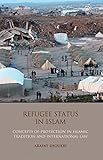Refugee status in Islam : concepts of protection in Islamic tradition and international law / Arafat Madi Shoukri.
Material type: TextSeries: International library of migration studies: 7.Publisher: London ; New York : I.B. Tauris, 2011Description: vi, 215 pages ; 23 cmContent type: text Media type: unmediated Carrier type: volumeISBN: 9781848853904; 1848853904Subject(s): Convention Relating to the Status of Refugees (1951 July 28) | Convention Relating to the Status of Refugees (1951 July 28) | Genfer Flüchtlingskonvention | Refugees (Islamic law) | Refugees -- Legal status, laws, etc | Refugees (Islamic law) | Refugees -- Legal status, laws, etc | Islam | Flüchtling | Flüchtling | Islam | RechtsstellungDDC classification: 340.59 LOC classification: KBP1538 | .S54 2011
TextSeries: International library of migration studies: 7.Publisher: London ; New York : I.B. Tauris, 2011Description: vi, 215 pages ; 23 cmContent type: text Media type: unmediated Carrier type: volumeISBN: 9781848853904; 1848853904Subject(s): Convention Relating to the Status of Refugees (1951 July 28) | Convention Relating to the Status of Refugees (1951 July 28) | Genfer Flüchtlingskonvention | Refugees (Islamic law) | Refugees -- Legal status, laws, etc | Refugees (Islamic law) | Refugees -- Legal status, laws, etc | Islam | Flüchtling | Flüchtling | Islam | RechtsstellungDDC classification: 340.59 LOC classification: KBP1538 | .S54 2011| Item type | Current library | Call number | Copy number | Status | Notes | Date due | Barcode |
|---|---|---|---|---|---|---|---|
 Books
Books
|
Female Library | KBP1538 .S54 2011 (Browse shelf (Opens below)) | 1 | Available | STACKS | 51952000202561 | |
 Books
Books
|
Main Library | KBP1538 .S54 2011 (Browse shelf (Opens below)) | 1 | Available | STACKS | 51952000202578 |
Includes bibliographical references (pages 197-208) and index.
The Jiwār in the Jāhiliyya -- Jiwār in the Islamic tradition in the Meccan period -- Amān (safe conduct) in the Islamic tradition -- The 1951 Geneva Convention relating to the status of refugees in the light of the Islamic tradition.
"Here, Arafat Madi Shoukri delves into fifteen centuries of Arab and Islamic history, examining hundreds of ancient sources to establish Islam's position on refugees. To trace the origins of the Islamic concept of aman, he begins by exploring life in the period of the jahiliyya, before the advent of Islam, to explore the idea of jiwar (protection), which was a governing custom at that period. Refugee status in Islam furthermore highlights how the Prophet, the first asylum seeker in Islam, and his companions exploited jiwar on their journey to establish their state in Medina. More importantly, Shoukri also focuses on how these first Muslims treated those non-Muslims who sought jiwar in Medina"--Publisher description, p. [2] of dust jacket.
1 2

There are no comments on this title.